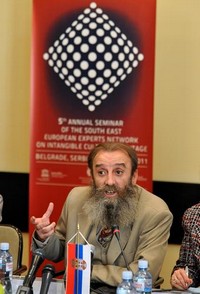- Serbia
Get to know Serbia
- Citizens
Culture and science
Health services
Pension and disability insurance
- Business
Employment
Economy
- Media
- Government
- Contact
Keep in touch
Contact form
Back
Keepin touch
Whether you have a question, comment, suggestion or any problem in the purview of the government, send us your message and we will try to respond as soon as possible. If your problem is not in our purview, we will forward your message to the relevant institution.
Q:
A:
Continuous work on preserving intangible cultural heritage necessary
Belgrade,
12 May 2011
Minister of Culture, Media and Information Society Predrag Markovic opened today the Fifth annual seminar on intangible cultural heritage in southeastern Europe themed "From national implementation to regional cooperation".
Opening this gathering in the Museum of Ethnography, Markovic said that work on preservation of intangible and tangible cultural heritage must be continuous and that no level of government is exempted from this obligation.
He assessed that the ratification of the UNESCO Convention for the safeguarding of the intangible cultural heritage is not sufficient and that it is necessary that different levels of government, individuals and ethnic groups get activated in this field.
The Minister pointed out that since 2003 until today, 134 out of 193 UNESCO member states signed the convention and stressed that the speed with which countries around the world sign this document stems from the world’s concern for intangible cultural heritage, which is much more endangered than the tangible.
It is important that every country preserves not only hers, but the heritage of others as well, he said and added that in order to do this it is necessary to establish harmony and similarities in the standards, methods, mode of transmission of experiences, technologies, all this with the aim of further highlighting and perseveration of differences. The conservation of intangible cultural heritage has special importance for countries of southeastern Europe and represents a place of reconciliation.
Director of the UNESCO Office in Venice and Regional Bureau for Science and Culture in Europe Anthony Krause said that promotion of intangible heritage scores high among political priorities of Serbia, but of the entire region as well. He said that the Regional Centre for Intangible Cultural Heritage in Sofia should contribute to improving the protection of intangible cultural heritage, as well as seminars of this type that contribute to the exchange of positive experiences and international cooperation.
As part of this seminar, which will last until 14 May, experts from 16 countries will be able to share experiences on the implementation of national measures for the preservation of intangible cultural heritage and to identify ways to enhance regional and international cooperation.
The topics of three roundtables will be implementation of UNESCO's Convention for the safeguarding of the intangible cultural heritage, identification and cataloguing of the intangible cultural heritage, and training and capacity building.
He assessed that the ratification of the UNESCO Convention for the safeguarding of the intangible cultural heritage is not sufficient and that it is necessary that different levels of government, individuals and ethnic groups get activated in this field.
The Minister pointed out that since 2003 until today, 134 out of 193 UNESCO member states signed the convention and stressed that the speed with which countries around the world sign this document stems from the world’s concern for intangible cultural heritage, which is much more endangered than the tangible.
It is important that every country preserves not only hers, but the heritage of others as well, he said and added that in order to do this it is necessary to establish harmony and similarities in the standards, methods, mode of transmission of experiences, technologies, all this with the aim of further highlighting and perseveration of differences. The conservation of intangible cultural heritage has special importance for countries of southeastern Europe and represents a place of reconciliation.
Director of the UNESCO Office in Venice and Regional Bureau for Science and Culture in Europe Anthony Krause said that promotion of intangible heritage scores high among political priorities of Serbia, but of the entire region as well. He said that the Regional Centre for Intangible Cultural Heritage in Sofia should contribute to improving the protection of intangible cultural heritage, as well as seminars of this type that contribute to the exchange of positive experiences and international cooperation.
As part of this seminar, which will last until 14 May, experts from 16 countries will be able to share experiences on the implementation of national measures for the preservation of intangible cultural heritage and to identify ways to enhance regional and international cooperation.
The topics of three roundtables will be implementation of UNESCO's Convention for the safeguarding of the intangible cultural heritage, identification and cataloguing of the intangible cultural heritage, and training and capacity building.
-
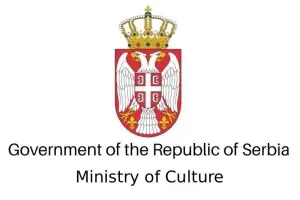 Belgrade, 10 November 2025
Belgrade, 10 November 2025Initiative to ban photo exhibition “Serbian Woman” attack on historic memory
-
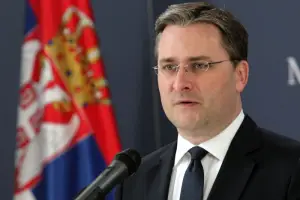 Belgrade, 8 November 2025
Belgrade, 8 November 2025Croatia obliged to respond adequately to emergence of hatred, extremism against Serbs
-
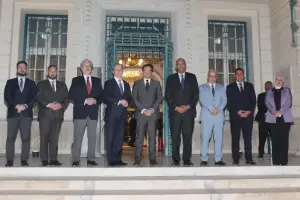 Belgrade/Cairo, 3 November 2025
Belgrade/Cairo, 3 November 2025Culture as foundation for enhancing overall relations between Serbia, Egypt
-
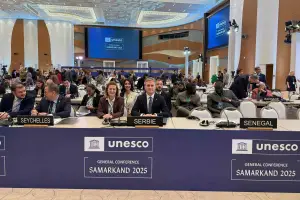 Belgrade/Samarkand, 31 October 2025
Belgrade/Samarkand, 31 October 2025Serbia’s continued commitment to preservation of cultural heritage
-
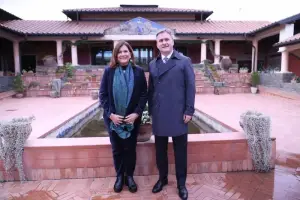 Požarevac, 24 October 2025
Požarevac, 24 October 2025Strengthening cooperation with Cyprus in field of cultural heritage protection
-
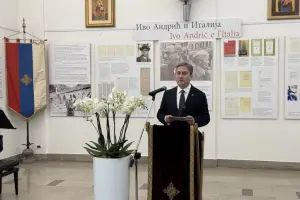 Belgrade/Trieste, 18 October 2025
Belgrade/Trieste, 18 October 2025Exhibition on Ivo Andrić in Trieste new bridge of cultural cooperation with Italy
-
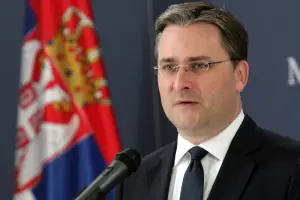 Belgrade, 7 October 2025
Belgrade, 7 October 2025Condemnation of marking Serbian cultural heritage as Albanian
-
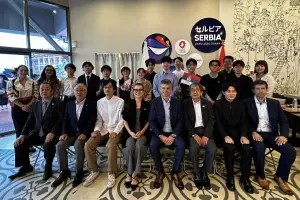 Belgrade/Osaka, 5 October 2025
Belgrade/Osaka, 5 October 2025Virtual promotion of Serbian tradition, culture in Osaka
-
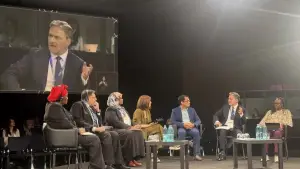 Belgrade/Barcelona, 1 October 2025
Belgrade/Barcelona, 1 October 2025Cultural heritage as foundation of preserving national identity
-
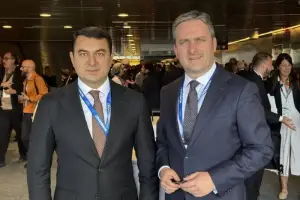 Belgrade/Barcelona, 29 September 2025
Belgrade/Barcelona, 29 September 2025Cultural cooperation between Serbia, Azerbaijan to further strengthen overall relations

